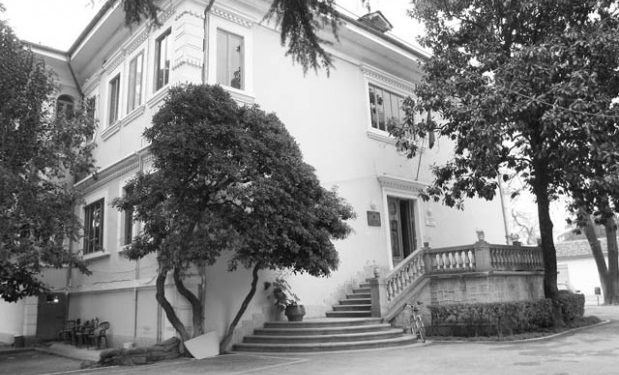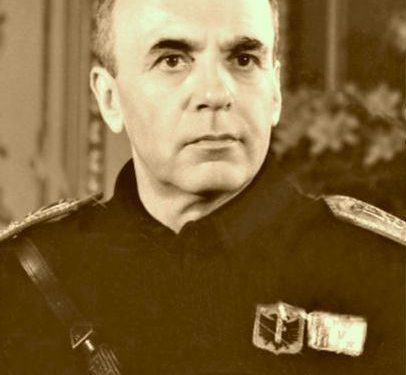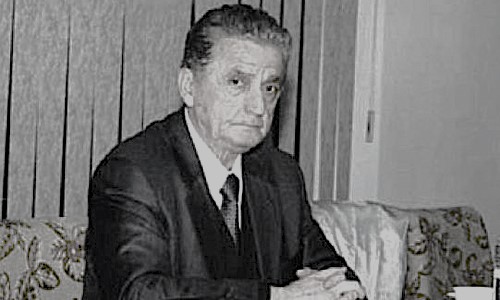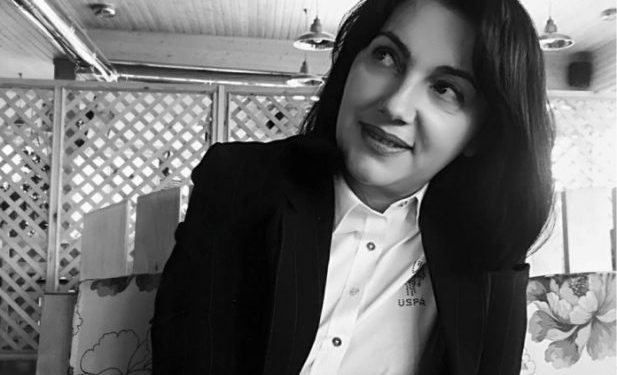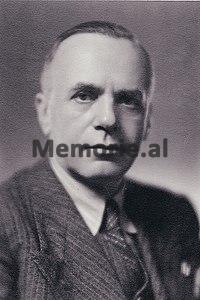Memorie.al / The official initiative to rewrite the history of our nation based on documents and facts, it is clear that it could not but generally arouse great interest. This, in principle. However, behind every such circumstance and initiative, the obstacles are so numerous and varied that they often remain just initiatives. And the hopes they awaken in people? They remain only unrealized dreams! We will now narrow the circle of considerations. Again, in principle, when speaking of a revision of written history, which especially during the period of the dictatorship was deformed, truncated, and disfigured on one side, while inflated with completely untrue data on the other, and which became school nourishment for entire generations, it is quite clear that the burden should fall on the shoulders of historians, who, with the greatest will and honesty, should face this task of national honor and move the work forward. However, the bitter reality stands completely different!
Linguists, and not historians, are the ones who are showing that they have felt this injustice the most, and thus are trying to break the new path. Specifically, in his field, it was the highly distinguished linguist Prof. Eqrem Çabej, who throughout the dictatorship showed the example of how principles are not trampled upon. In his studies on the etymology of the Albanian Language, he repeatedly refers to the author “Shpend Bardhi” and his conclusions.
And who was hiding under the pseudonym “Shpend Bardhi”? No one else but the giant of Albanian linguistics, Mustafa Merlika Kruja! However, the voice of Professor Çabej remained a voice in the wilderness at the time. No one else dared to play with fire like him. Finally, the dictatorship crumbled. The time came for historians, as well as academic historians, to speak their minds. But silence characterized them!
Great were the sums of lickings they had to perform, because such was the amount of their spit that they had spread: they couldn’t manage it! They, specifically regarding the figure of Mustafa Merlika Kruja, (since I am referring to this example), had built a massive dam-fence of endless, low-level slanders, distortions, and insults, so much so that the person of Mustafa Merlika was presented before the eyes of Albanians as the “typical Albanian Quisling,” “criminal… traitor of Albania,” and we could add more bad things and nothing else!
You had nothing more to learn about him. Thus, none of the scholars of the younger generations considered that Mustafa Merlika Kruja was one of those who had justified the founding of the Albanian State on the distant November 28, 1912. They could not even conceive how he, although accused as an extreme fascist, as prime minister insisted that the signs of the Lictor and the knot of Savoy be removed from our national flag. Could anyone conceive that by his order, over 300 Jewish families were brought from Kosovo, saving their lives from the Holocaust?
How could they learn that he was also a great cultivator of the Albanian Language? The dam-fence around his personality was built with slanders and insults by politicians as well as pseudo-historians of socialist realism, all mixed with their spit. This condemned this great personality to darkness – knowledge of him, as well as his work until today.
Scholars Pjetër Pepa, Fritz Radovani – De Angeliis, Uran Butka, Agim Musta, (the undersigned), as well as others, have written and continue to write volumes of a historical nature. Or recently, the scholar and journalist, Mr. Kastriot Dervishi, has published a volume of major interest titled “History of the Albanian State 1912 – 2005” where future scholars will find the structures of the state across different time periods, as well as the name lists of state leaders.
Meanwhile, our academic historians, like professors Paskal Milo and Xhelal Gjeçovi and their colleagues, continue to walk on the crooked tracks they themselves had laid during the dictatorship, never saying: “My fault, my fault, my fault”! So much for those who should have been the first to embark on the path of truth. We will now focus our attention on the linguists who are taking the reins that rightfully belonged to the historians.
On May 30, 2003, the linguist Mehmet Elezi published in black and white and posed the major question: Who destroyed Mustafa Kruja’s Dictionary of the Albanian Language? – Perhaps it is good for academics to talk about history, so that history does not talk about them tomorrow! – Mr. Elezi continues: “Until recently, few people knew that Mustafa Kruja was, in addition to being a great anti-communist, also a great Albanian scholar and linguist.
Some treatments that have recently come to light, however partial, seem to support the known sayings that the truth sinks anyway, but does not drown, it thins out but does not break. Or, let’s say, it delays but does not forget. They testify that Kruja has a place of honor in the Academy of Sciences of Albania and in the all-Albanian memory, as the author of the first great monolingual dictionary of the Albanian language. He has a place of denied honor for reasons that can only not serve national interests.
Seeing the Byzantine silence of the academic institutions for which all of us are taxpayers, the silence of some academics appointed as such more by the state than by their works, I feel it necessary to return to this issue for the second time. I say for the second time because I also addressed it a few months ago in the book; ‘The Albanian Language in the Bunker’…
Where did this dictionary go, who destroyed it?! It is possible that this dictionary was utilized without ever mentioning the author’s name, as happened with many others, even with a part of Ramadan Sokoli’s musical works…! Ezra Pound was a declared fascist by conviction, but this has not shadowed the greatness of his poetic art, which is valued outside of politics for his genius.
And for Mustafa Kruja, as well as for some other major figures, there are voices and documents coming to light according to which the assessment of him as a politician until now has been unsupported, that his personality is contrary to what the official propaganda has depicted for decades. But this is another matter. Now we are talking about his dictionary.”
And Mr. Mehmet Elezi, searching for the thread of Mustafa Kruja’s dictionary, concludes his writing as follows: “Dear esteemed academics, perhaps it is good for you to talk about history, so that history does not talk about you tomorrow!”
We continue with the testimony of the scholar Mr. Shaban Sinani. On August 4, 2005, in the analysis titled; “Jewish Culture in Albania,” the scholar and linguist Mr. Shaban Sinani (at the time the General Director of the State Archives) provides several documented examples of how the Albanian state administration before 1945 acted with full responsibility and non-conformist stance toward the authorities of the German occupying army.
He brings as an example the letter from the Political Office of the Ministry of Internal Affairs addressed to the Ministry of Foreign Affairs in May 1944 (referring to telegram no. 191 of the Prefect of Shkodër, Mr. Javer Hurshiti, who was executed by the dictatorship), which requests: “… we kindly ask you to mediate where necessary so that the German military authorities do not interfere in our internal affairs, only in those cases that directly concern the German army. In the name of the Minister: Gjon Çoba.”
Mr. Sh. Sinani further brings as an original example the translation of the text taken from the volume titled “La politica dell’Italia in Albania,” authored by Francesco Jacomoni (pages 288-289, Edizione Cappelli – 1965), where the Lieutenant General of the King of Italy in Albania testifies to how Prime Minister Mustafa Kruja had addressed Jacomoni, seeking help to save the lives of hundreds of Jews in Kosovo, for whose extradition to Germany the German Command had presented Prime Minister Mustafa Kruja with a detailed list.
Thus, Jacomoni, with the full will to support Mustafa Kruja’s request, did not address official Rome for approval, but privately informed the general director of “secret affairs,” plenipotentiary minister Vidau, who was a broad-minded man.
Immediately, the Prime Minister organized the transfer of the Jews from Kosovo to Albania, and thus, after a few days, Prime Minister Kruja replied to the German Consul General that, following verification, the information provided by the German command was not correct.
Furthermore, Albania became a refuge for a large number of Jews who were equipped with regular Albanian documents, by order of Prime Minister Mustafa Kruja himself. What was presented above was, using a term from music, the “overture,” or that musical part played by the orchestra before the start of the main part of the performance itself. I felt compelled to make this comparison, wanting to name the interview given by the linguist and scholar Ms. Ledi Shamku, regarding the work written by Mustafa Merlika Kruja in 1955, titled:
“An Analytical Study – What Frangu i Bardhë teaches us with his dictionary,” as the main part of the performance, following the overture. Why, one might ask? Because, at least according to me, I consider that after the attempts made until today (by the two aforementioned linguist authors, by Dr. Ardian Ndreca, or by the author of these lines) to break that wall of silence and disregard that surrounded the towering figure of Mustafa Merlika Kruja, only with the slanders and political distortions of the historian-politicians of the dictatorship era, fate willed it that, as the linguist scholar Ms. Ledi Shamku states: “It was a stroke of fortunate chance (for me) that the descendants of the Kruja family, through their friends, had come into contact with some books of the Excipere necklace, which I direct.
It was also fortunate that Mustafa Kruja’s sons continued to preserve their sensitivity to Albanian philology, undoubtedly nourished by him. And these two factors led to the creation of that essential spirit of affinity between us, to believe in the seriousness of such an undertaking.” While, along this furrow, I would add that I would also call the late Mustafa Merlika Kruja himself fortunate.
This is because his sons, Bashkim and Fatosi, as well as his nephew Eugjen, are still alive, they have the manuscripts of their Father and grandfather, they managed to confront a scholar like Ms. Ledi Shamku with the aforementioned work, and she was surprised.
She was surprised, but she also acted! And after this initial action, this honest and impartial scholar cannot fail to be confronted with other surprises, the more deeply she gets to know the work of Mustafa Merlika Kruja!
This makes me hope that the dam-fence that surrounded his towering figure until now has begun to break apart. Did the linguists and academics of the Institute of Linguistics know his great work, the Dictionary? Without the slightest doubt!
How did they act? They exploited the work while leaving the author in oblivion! Why do I take the liberty to think they exploited his work? Because if they hadn’t exploited it, fine, they were silent out of fear until the dictatorship crumbled, but during these years that followed, why didn’t they speak?! Without intending to continue with actual investigations, I will stop at Ms. Ledi Shamku.
This linguist, in love with the field of knowledge to which she is dedicated, as soon as a small window opened for her to observe and know the multi-faceted figure of Mustafa Merlika Kruja, without delay begins to be enlightened, with that false fog with which the appointed academics (as the scholar Mehmet Elezi calls academics without works) had hidden Mustafa Kruja for decades, disappearing before her eyes, and she makes an assertion that I consider very important, even being outside her field. / Memorie.al




